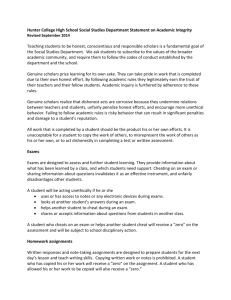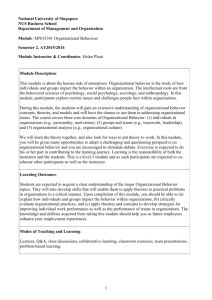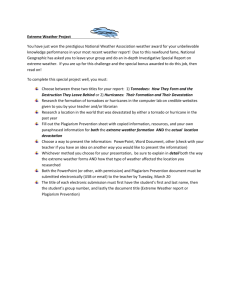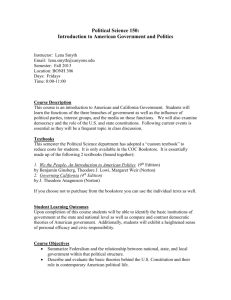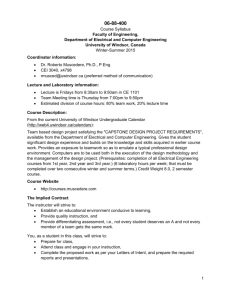COURSE OUTLINE - University of Windsor
advertisement
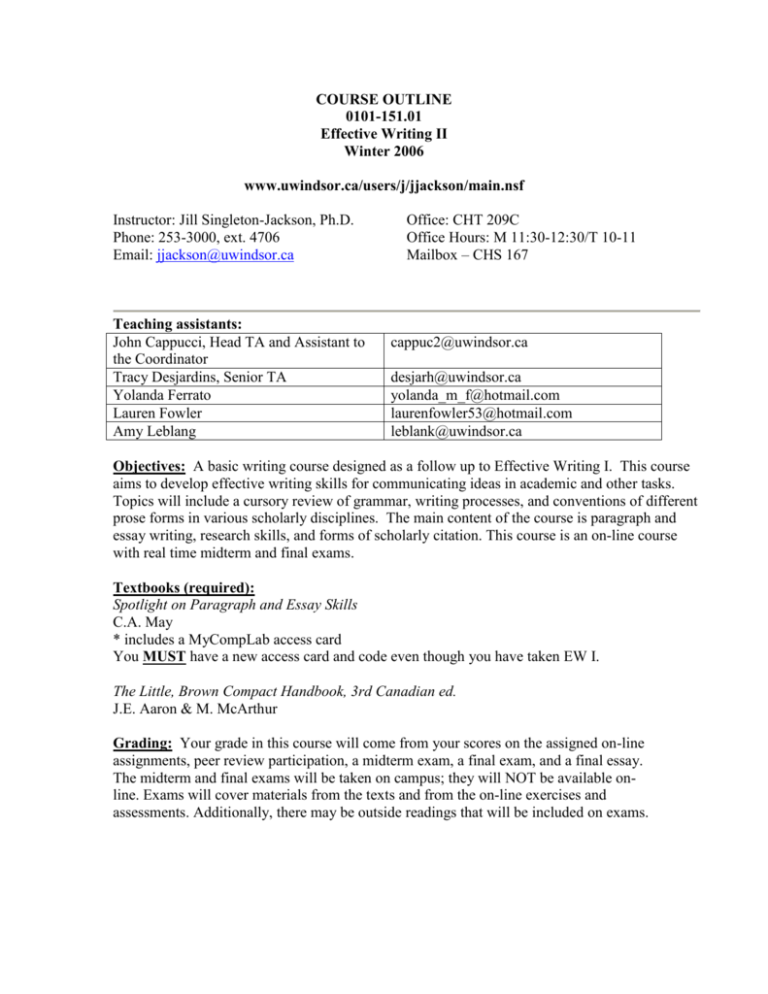
COURSE OUTLINE 0101-151.01 Effective Writing II Winter 2006 www.uwindsor.ca/users/j/jjackson/main.nsf Instructor: Jill Singleton-Jackson, Ph.D. Phone: 253-3000, ext. 4706 Email: jjackson@uwindsor.ca Teaching assistants: John Cappucci, Head TA and Assistant to the Coordinator Tracy Desjardins, Senior TA Yolanda Ferrato Lauren Fowler Amy Leblang Office: CHT 209C Office Hours: M 11:30-12:30/T 10-11 Mailbox – CHS 167 cappuc2@uwindsor.ca desjarh@uwindsor.ca yolanda_m_f@hotmail.com laurenfowler53@hotmail.com leblank@uwindsor.ca Objectives: A basic writing course designed as a follow up to Effective Writing I. This course aims to develop effective writing skills for communicating ideas in academic and other tasks. Topics will include a cursory review of grammar, writing processes, and conventions of different prose forms in various scholarly disciplines. The main content of the course is paragraph and essay writing, research skills, and forms of scholarly citation. This course is an on-line course with real time midterm and final exams. Textbooks (required): Spotlight on Paragraph and Essay Skills C.A. May * includes a MyCompLab access card You MUST have a new access card and code even though you have taken EW I. The Little, Brown Compact Handbook, 3rd Canadian ed. J.E. Aaron & M. McArthur Grading: Your grade in this course will come from your scores on the assigned on-line assignments, peer review participation, a midterm exam, a final exam, and a final essay. The midterm and final exams will be taken on campus; they will NOT be available online. Exams will cover materials from the texts and from the on-line exercises and assessments. Additionally, there may be outside readings that will be included on exams. The weighting for the course assignments and exams will be as follows: On-line assignments– 35% Participation in on-line peer review process – 10% Final Essay – 15% Midterm Exam – 20% Final Exam – 20 % Conversion of raw score into letter grades: GRADE A+ A AB+ B BC+ RAW SCORE 93-100 86-92.99 80-85.99 77-79.99 73-76.99 70-72.99 67-69.99 GRADE C CD+ D DF F- RAW SCORE 63-66.99 60-62.99 57-59.99 53-56.99 50-52.99 35-49.99 0-34.99 To Contest a Mark: In the event you wish to contest a mark on an exam or assignment, you will need to outline the reasons you wish to contest (i.e., why your mark should be changed) in written form -- typed or word-processed. You will need to hand that request in with the original marked paper to the TA who marked your work or the Head TA. Challenges to marks will be accepted for 10 days after you have received your mark. After 10 days, challenges will no longer be entertained. Course Website: The address for the course website is www.uwindsor.ca/users/j/jjackson/main.nsf It is important that you check the website frequently. READ THIS!!! Plagiarism and Examination Make-up Policies 1. Plagiarism Plagiarism is a serious academic offense because it dishonestly and fraudulently uses someone else’s work as one’s own. Students are to be evaluated on the basis of their own original work. In the preparation of essays, papers, reports, and any other types of assignments, students must necessarily rely on the work of others. However, it is imperative that the source of any ideas, wording, or data obtained from others be disclosed and properly acknowledged by citations, quotation marks, and bibliographic references in the proper format. Using the work of others without acknowledgment is plagiarism. Plagiarism includes, but is not limited to: a) Using a passage or passages of any length from published or unpublished work of others without placing the passage(s) in quotation marks (or using indentation for long quotation(s)) and acknowledging their source; b) Submitting work as original when that work also has been or is currently being submitted for another course, unless prior permission has been given in writing; c) Copying material, for example, from the Internet, or purchasing material and submitting it as one’s own; d) Submitting work completely or largely identical to that of other students, unless group work and joint submissions are explicitly permitted by the instructor. In cases of plagiarism, the instructor assigns a grade of 0 (F-) to the work in question. This will be decided in consultation with the AAU head or designate. If an instructor determines that plagiarism has occurred, the student shall be informed and the case reported to the Executive Dean of the Faculty. Disciplinary proceedings may be initiated pursuant to Senate Bylaw 31, which could result in suspension or expulsion from the University in cases of repeated plagiarism. Students will not be allowed to re- write or resubmit work to compensate for grades assigned as a result of plagiarism. Students can appeal a plagiarism grade to the AAU head or designate and/or to the Administrative Dean of Student and Academic Services, and ultimately to a judicial review panel at the University. 2. Exam Policy The Policy of the Faculty of Arts and Social Sciences is not to allow make-ups for scheduled tests, midterms, or final exams, nor to assign a grade of Incomplete without acceptable and verifiable medical (or equivalent compassionate) reason. Acceptable reasons might include hospital stays, serious illness, family emergencies (like serious accidents or illnesses, death) or similar circumstances. Normally, written documentation stating specific reasons and dates is required. Arrangements for make-up exams--if allowed by the instructor--must be made as soon as possible. The instructor establishes the date and format for make-up exams, which will usually differ from the original exam. The Human Rights Office All students, staff and faculty are obligated to interact on the basis of mutual respect. The University of Windsor is committed to the creation of a campus that is free of harassment and discrimination. It has a Human Rights Policy whose aim is the prevention of behaviours that are prohibited by the Ontario Human Rights Code, including sexual harassment. The University's Human Rights Office provides a place on campus where all members of the University community are welcome. If you feel as though you have been treated unfairly, discriminated against or harassed and that the behaviour is related to a prohibited ground (e.g. colour, disability, ethnic origin, gender, race, religion, sexual orientation, etc.), you can voice your concern with the Human Rights Office. The staff can provide you with information and advice. All concerns brought to the Office are kept confidential unless you choose to file a formal complaint. The Office can be reached at extension 3400.
